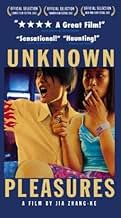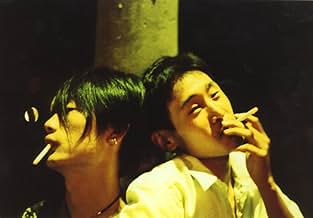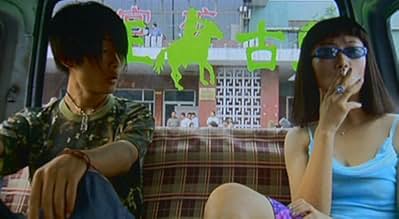IMDb RATING
6.8/10
2.8K
YOUR RATING
Two unemployed Chinese teenagers have trouble resisting the temptations of the Western world.Two unemployed Chinese teenagers have trouble resisting the temptations of the Western world.Two unemployed Chinese teenagers have trouble resisting the temptations of the Western world.
- Awards
- 2 wins & 5 nominations total
Limin Wang
- The Karaoke Customer
- (as Wang Li Min)
Juan Antonio Samaranch
- Self
- (archive footage)
- (uncredited)
Jia Zhang-ke
- Man singing in street
- (uncredited)
- Director
- Writer
- All cast & crew
- Production, box office & more at IMDbPro
Featured reviews
The story begins with an outline of the mundaneness of the lives and future of two Chinese youths, and progresses into showing in a short amount of time just how much their lives and personal situations change; dealing with unemployment, troublesome love lives and coming into their own a beautiful story unfolds.
With allusions to the film Pulp Fiction throughout and a recurring song that touches the heart, with solid performances by all of the actors (especially Zhao Tao) it was a very good film. My only criticism is at times the story can be slow, though overall the story is far more interesting than one sees in normal cinema.
The film was particularly strong in the simplistic nature of the film-making itself, with nothing ever over-the-top. It aimed to tell the situation as how it really is, and to tell life like how it really is, not some sort of Hollywoodized conception of life. The artistic reflection that was put into the film shows a great and amazing depth to it that is often hard to find.
Overall, a great film my Jia Zhang-ke. The feelings of hopelessness that he is able to make oneself feel make this a must-see for anyone who enjoys sad cinema and existentialism, and is interested in the struggles of youth and issues of modernization and globalization.
With allusions to the film Pulp Fiction throughout and a recurring song that touches the heart, with solid performances by all of the actors (especially Zhao Tao) it was a very good film. My only criticism is at times the story can be slow, though overall the story is far more interesting than one sees in normal cinema.
The film was particularly strong in the simplistic nature of the film-making itself, with nothing ever over-the-top. It aimed to tell the situation as how it really is, and to tell life like how it really is, not some sort of Hollywoodized conception of life. The artistic reflection that was put into the film shows a great and amazing depth to it that is often hard to find.
Overall, a great film my Jia Zhang-ke. The feelings of hopelessness that he is able to make oneself feel make this a must-see for anyone who enjoys sad cinema and existentialism, and is interested in the struggles of youth and issues of modernization and globalization.
I saw this film at the IFP LA Film Festival on June 16, 2003. It started out pretty well, but became aimless and sort of meandered. I couldn't root for any of the characters. The background of economically depressed mainland China is interesting, but only for a while. After half an hour, I wanted characters I cared about, but this movie didn't have any. It's not that the young actors weren't talented, it's just that the script was anti-climatic and didn't leave me wanting more, I just wanted the movie to end.
I'm confused as to why people would still give the pleasant peasant fables of Zhang Yimou house-room now we're offered a view of intense, complex, and contemporary Chinese cinema like this. I adored the extreme negativity of this film's most repetitive moments: Xiao Ji getting slapped about the face ("having a good time?" "yes" "having a good time?" "yes" "having a good time?" "yes" "having a good time?" "yes"...) or trying repeatedly to drive up a slight slope on his motorbike. The very repeatability of film seems to highlight the way that only this silly, essentially boring medium gets at what's going on when stuff happens, in capitalist China as well as at home...
Unknown Pleasures portrays Bin Bin and Xiao Ji, two young Chinese men living in the city of Datong, several hundred miles west of Beijing. Theirs is a city in transition; crowded streets and apartment blocks back onto building sites, weird landscapes of debris and raw materials. The growing commercialisation of Chinese society is readily apparent; in an early scene the duo attend a lurid road show promotion for alcoholic drinks. The television news that punctuates the film shows the changes and conflicts in China and the effect these are having across the world, from the controversial US spy plane crash to the award of the Olympic games for 2008.
The two young protagonists are outsiders in their changing city. Bin Bin, newly unemployed, lives with his mother. Unwilling then unable to find new employment, he becomes increasingly despondent. His relationship with his girlfriend, Yuan Yuan, is lived out in front of a television screen: they rarely make eye contact. The cultural void in his life feels remarkably Western. Xiao Ji works for his father's garage business. Whilst Bin Bin becomes increasingly downcast, Xiao Ji dreamily pursues Xiao Wu, a dancer with the aforementioned road show, risking the anger of her volatile boyfriend.
The overlapping stories of the two friends develop a common theme of loneliness and yearning on the fringes of a rapidly changing society. The sense of despair and malaise in their lives is powerfully conveyed, but the increasing aimlessness of their activities makes for slow and often difficult viewing. The final third of the film is particularly slow, with many drawn-out scenes. Despite this slackening of the pace, an unexpected twist at the end rams home the film's message that, along with the new freedoms in China, there is disenchantment with the new shape of society.
The two young protagonists are outsiders in their changing city. Bin Bin, newly unemployed, lives with his mother. Unwilling then unable to find new employment, he becomes increasingly despondent. His relationship with his girlfriend, Yuan Yuan, is lived out in front of a television screen: they rarely make eye contact. The cultural void in his life feels remarkably Western. Xiao Ji works for his father's garage business. Whilst Bin Bin becomes increasingly downcast, Xiao Ji dreamily pursues Xiao Wu, a dancer with the aforementioned road show, risking the anger of her volatile boyfriend.
The overlapping stories of the two friends develop a common theme of loneliness and yearning on the fringes of a rapidly changing society. The sense of despair and malaise in their lives is powerfully conveyed, but the increasing aimlessness of their activities makes for slow and often difficult viewing. The final third of the film is particularly slow, with many drawn-out scenes. Despite this slackening of the pace, an unexpected twist at the end rams home the film's message that, along with the new freedoms in China, there is disenchantment with the new shape of society.
I don't recall where I read a favorable review of this art film, but if I did I would make sure I don't rent anything else they recommend. This film went nowhere. Two Chinese boys with no motivation. They don't take any risks really, and neither do the filmmakers. I was not left with any particular emotion or thought. Photographically it was OK. Perhaps the filmmaker was going for Bergman type effect of portraying emotional emptiness. And maybe its a cultural translation I'm not getting.
Saw parts of China not seen before - the more urban dirty landscape.. So that was a plus. I liked the girl. Her character had the most um, character.
Saw parts of China not seen before - the more urban dirty landscape.. So that was a plus. I liked the girl. Her character had the most um, character.
Did you know
- TriviaMandarin title refers to a song by Richie Jen
- Quotes
Mr. Ren: Welcome to auditions for the Mongolian King Liquor Troupe! Please applaud our city's famous singer and dancer, Miss Zhao Qiao Qiao, in her modern dance number titled "Unknown Pleasures". The performance reminds us the Mongolian King spirits! Drink Mongolian King! Drink Mongolian King!
- ConnectionsFeatures Havoc in Heaven (1961)
Details
Box office
- Gross US & Canada
- $11,254
- Opening weekend US & Canada
- $3,628
- Mar 30, 2003
- Gross worldwide
- $55,901
Contribute to this page
Suggest an edit or add missing content






















